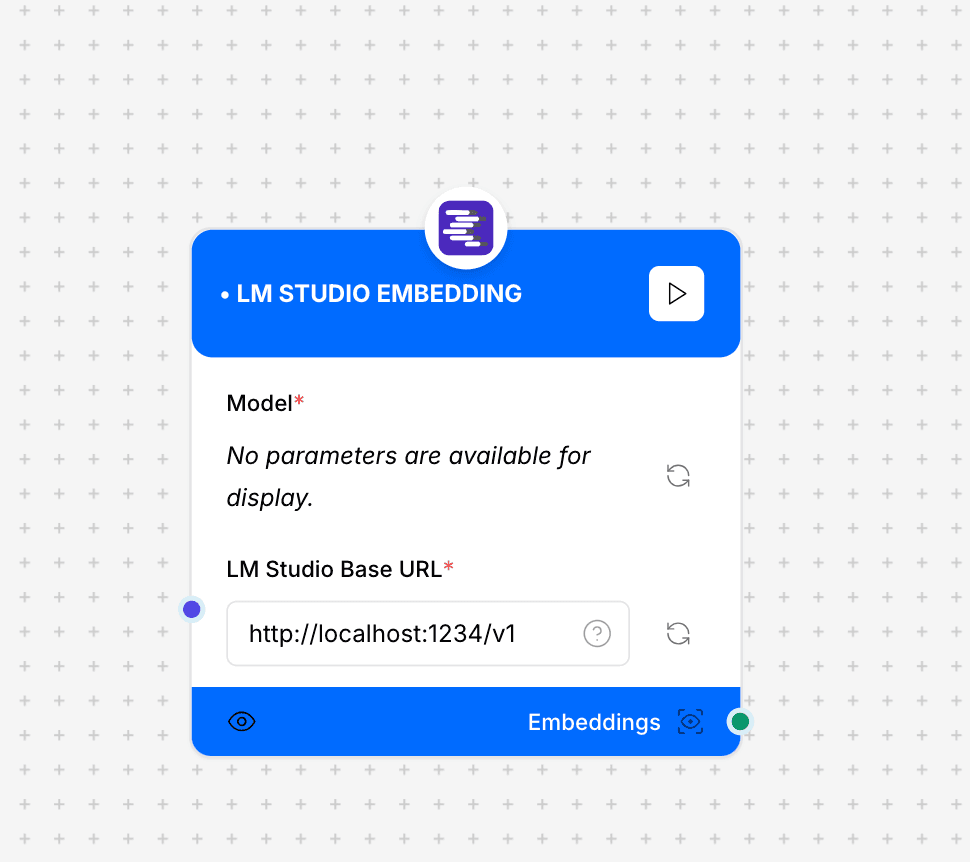LM Studio Embeddings
Generate embeddings using LM Studio's local model server. Perfect for running embeddings locally with a user-friendly interface and support for multiple open-source models with complete data privacy.

LM Studio Embeddings component interface and configuration
LM Studio Requirement: This component requires the LM Studio application to be installed and running with a local server enabled. Make sure you have loaded a compatible embedding model in LM Studio before using this component.
Component Inputs
- LM Studio Base URL: The URL of your local LM Studio server
Example: "http://localhost:1234/v1"
- LM Studio API Key: API key (if configured in LM Studio)
Example: "lmstudio-xyz123" or empty string if not using authentication
- Temperature: Controls randomness in embedding generation
Example: 0.0 (Default, recommended for consistent embeddings)
- Input Text: Text content to convert to embeddings
Example: "This is a sample text for embedding generation."
Component Outputs
- Embeddings: Vector representation of the input text
Example: [0.024, -0.015, 0.056, ...]
- Dimensions: Size of the embedding vector
Example: Varies based on the model loaded in LM Studio (typically 768, 1024, or 4096)
- Metadata: Additional information about the embedding process
Example: model_info: all-MiniLM-L6-v2, temperature: 0.0, processing_time: 135
Model Selection
Compatible Models
LM Studio supports various embedding models that can be downloaded and used locally
- Sentence Transformers (all-MiniLM-L6-v2, all-mpnet-base-v2)
- E5 Models (e5-small, e5-base)
- BGE Models (bge-small-en, bge-base-en)
- Any other embedding model compatible with LM StudioModel Considerations
When selecting a model in LM Studio, consider these factors:
- Model Size: Smaller models load faster but may produce lower quality embeddings
- RAM Requirements: Larger models need more system memory
- Vector Dimensions: Different models produce different embedding sizes
- Language Support: Some models are English-only, others are multilingualImplementation Example
// Basic configuration
const embedder = new LMStudioEmbeddor({
lmStudioBaseUrl: "http://localhost:1234/v1",
lmStudioApiKey: "your-api-key"
});
// Configuration with temperature
const customEmbedder = new LMStudioEmbeddor({
lmStudioBaseUrl: "http://localhost:1234/v1",
lmStudioApiKey: "your-api-key",
temperature: 0.7
});
// Generate embeddings
const result = await embedder.embed({
input: "Your text to embed"
});
// Batch processing
const batchResult = await embedder.embedBatch({
inputs: [
"First text to embed",
"Second text to embed"
]
});
console.log(result.embeddings);Use Cases
- Privacy-Focused Applications: Generate embeddings without sending data to external APIs
- Local Development: Test and prototype embedding-based applications without API costs
- Offline Environments: Create embeddings in environments without internet access
- Model Comparison: Test different embedding models using LM Studio's user-friendly interface
- Educational Projects: Learn about embeddings without subscription requirements
Best Practices
- Verify the LM Studio server is running before attempting to generate embeddings
- Pre-load models in LM Studio to avoid delays when making the first request
- Monitor system resource usage, especially when using larger models
- Use appropriate batch sizes to balance throughput and memory usage
- Implement error handling for connection issues with the local server